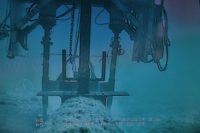With a deadline looming, Canada is fighting against the closure of Line 5, a 68-year-old underwater line that carries crude oil and natural gas liquids through the Straits of Mackinac that Michigan Gov. Gretchen Whitmer wants shut down due to spill risks.
In November, Whitmer, a Democrat, (D) announced she was revoking a permit that allows Calgary, Alberta-based multinational energy provider Enbridge Inc. to operate the Michigan portion of the Line 5, a 4-mile section along the bottom of the straits between Lake Michigan and Lake Huron.
Citing concerns over the environmental damage a spill or leak would cause, Whitmer gave the company until May 12 to shut it down. “Enbridge has routinely refused to take action to protect our Great Lakes and the millions of Americans who depend on them for clean drinking water and good jobs,” she said at the time.
Whitmer alleged that Enbridge repeatedly violated terms of a 1953 easement, which allows for an extension of the 4-mile portion of the pipeline through the straits, by ignoring structural problems that put the lakes at risk.
The state specified two incidents in 2018 and 2019 in which the pipelines were struck, and a coating designed to protect them was damaged by cables or anchors from boats.
Ryan Duffy, a spokesperson for Enbridge, said this week that the company has no intention of shutting the pipeline.
“This matter is currently being litigated in federal court,” he said. “The parties are also engaged in mediation. Further, a treaty with Canada prohibits the state from taking unilateral action to close the pipelines.”
Although the state and Enbridge have been in negotiations, there is no word yet from Michigan on whether it has altered its position even as Canada has voiced support for uninterrupted operation of the line.
Kirsten Hillman, Canada’s ambassador to the U.S. said in an email that closing the pipeline would pose dire economic impacts for both countries.
She said it would significantly impact six refineries in Ontario and Quebec, as well as the Sarnia petrochemical manufacturing complex and producers in western Canada, as well as refineries in Michigan, Ohio and Pennsylvania that depend on the line for continued operation.
Closure of one of the U.S. refineries alone "would result in a loss of billions in annual economic output, with thousands of jobs potentially impacted,” she said.
Hillman added that raw materials supplied by Line 5 are refined to produce 55% of Michigan propane needs, and is essential to production of jet fuel for the Detroit airport. Residents of Michigan's Upper Peninsula rely on propane for home heating fuel, although the state's home energy generation mix is far more robust further south.
Hillman also asserted that rail and truck transport that would be needed in place of the pipeline would result in higher carbon dioxide emissions and transportation costs.
Hillman said Canadian officials have had 10 meetings with top Biden administration officials during which Line 5 was raised.
“In these meetings, we have highlighted the economic and energy security benefits to both countries of Line 5—part of our wider integrated relationship—as well as the significant impacts that a shutdown of the line would have,” she said in her letter.
Duffy agreed that closing the pipeline would have severe economic impacts for Canada. “What Line 5 supplies to Ontario and Quebec is critical for the economy and thousands of products Canadians rely on every day,” he said.
Roger Gauthier, treasurer of the Straits of Mackinac Alliance, a citizens group in the U.S. that supports Line 5 shutdown, believes the potential economic impacts of a closure on Michigan have been overstated.
“The Canadian government, especially the provincial government of Ontario, needs to recognize the [environmental] risk that this outdated line will pose to its own constituents,” he said. “Clearly the issues of economic impacts of a shutdown of the line by Enbridge are grossly overstated.”
He also said most commodities transported in the line go to Canadian refineries for Canadian consumption. “Very little of that has an impact on the energy needs of the state of Michigan and its constituents,” he said.
Enbridge's Duffy insists the pipeline is safe and the coating damage issue last July was simply proper maintenance.
“The federal safety regulator, the Pipeline and Hazardous Materials Administration, has consistently determined, as recently as 2020, that Line 5 is safe based on its review of extensive inspection data," he said.
Both Enbridge and Canadian officials favor a deal struck in 2018 with former Michigan Gov. Rick Snyder (R), which allows for replacement of the pipeline’s underwater portion with a new segment that would be contained inside a tunnel to be drilled through bedrock beneath the straits.
Duffy said Enbridge is seeking the permits needed to build the $500-million Great Tunnel project, which would include both lines and space for better regular maintenance as the tunnel is envisioned to be large enough for trucks to drive through.
“In the meantime, Line 5 must stay open,” he said. “It is a critical piece of North American energy infrastructure that benefits both Canada and the U.S.”
Hillman agreed. “Given Canada’s commitment to and investment in the Great Lakes, it is our view that the proposed Great Lakes Tunnel Project will enhance the protection of these waters.”
Gov. Whitmer's office was contacted but has responded to ENR queries.






Post a comment to this article
Report Abusive Comment